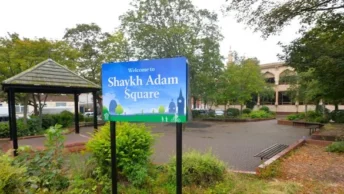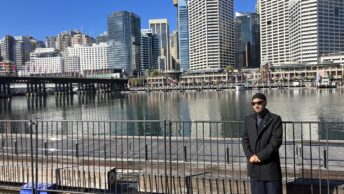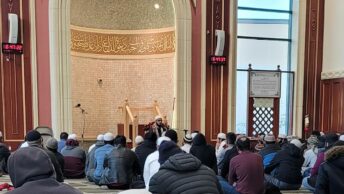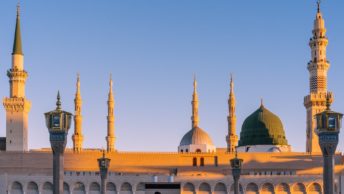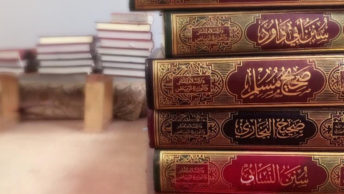In the name of Allah, Most Compassionate, Most Merciful
On Friday March 22, 2019, Muslims around the globe were shocked and saddened by the tragic news of an assassination attempt on the life of one of the greatest scholars of the modern era and my beloved teacher Shaykh al-Islām Mufti Muhammad Taqi Usmani (may Allāh protect him) of Karachi (Pakistan). It was an extremely distressing news for me personally as well. I have known the respected Shaykh for almost twenty years – having studied by him around 1999 – and most of what small effort I make in terms of teaching, writing, and dealing with people’s queries, etc, it is due to him and his teachings. His guidance and explanation of the true message of Islām is a beacon in this age of ideological confusion. As such, when I woke up on Friday morning to the news that there was an attempt to assassinate him, I was taken aback and extremely shaken. It indeed was one of the most distressing days of my entire life. No words can describe the inner feelings when one’s intellectual and spiritual mentor is attacked in such a horrific manner!
In terms of the actual incident, the Shaykh was on his way to lead jumu’a prayers at the Bayt al-Mukarram Mosque in the Gulshan Iqbal area of Karachi – as per his normal weekly practice. The drive is normally around 30-45 minutes in the car. He was accompanied in his car by his wife (may Allāh protect her) and his two grandchildren: a girl aged seven and boy aged five. The car was being driven by his personal driver called Habib, and a security police guard was sat in the front passenger seat. A second escorting car was being driven by another driver, and the Shaykh’s personal guard was sat in the passenger seat of that car. Gunmen on three motorbikes attacked both vehicles, not knowing which car Mufti Taqi (may Allāh protect him) was in. In fact they attacked his car twice, returning to make sure their “target” was dead. The police guard in the Shaykh’s vehicle was martyred and his driver injured. His personal guard in the other car was also martyred, and its driver severely injured.
Later that day after Asr salat, Mufti Taqi Usmani (may Allāh protect him) addressed students and teachers gathered in Darul Uloom Karachi and described what had occurred. He also subsequently gave interviews to a TV channel and the “Daily Ummat” newspaper in which he mentioned some really striking things. Below are some points to reflect upon in light of what the Shaykh himself outlined in his speech and interviews and some other accounts:
1) Widespread Love and Affection
The emphatic condemnation of this assassination attempt and the outpour of love, affection and support for Mufti Taqi Usmani (may Allāh protect him) from around the globe reflects how dear he is in the hearts of the people. In fact, it seems, this incident has taken his status in the eyes of people to another level. Many felt that it was a personal tragedy. Major scholars (ulamā’), politicians, academics and other leading figures from across Pakistan and beyond began visiting him personally. He was receiving overwhelming number of phone calls from his students, associates and well-wishers. I too made a call, but seeing that he must have been overwhelmed I concluded the call within two minutes. Hearing his relaxed voice and calm demeanour brought some comfort to the heart Al-Hamdulillah. Among those who called the Shaykh was the Imām of Majsid al-Haram in Makka al-Mukarrama, Shaykh Salih ibn Humayd (hafizahullah).
A large number of ulamā’ released their reflections and tributes in either written or audio format, with each one of them thanking Allāh for his protection and acknowledging the great value of Mufti Taqi to the umma. I repeatedly heard many of them say that he is an “asset” and “treasure” for this umma. A senior Pakistani journalist described him as the “guardian of ideological borders of the Muslim world” and made a plea that he must be protected with a bullet proof car, given that he is one of a kind and a national treasure of Pakistan which they must cherish. Poetry was also composed by various people in Arabic, Urdu and English in relation to the incident. They thanked Allāh for protecting this “asset” from the brutality of vile people. An innocent nine year old child from Bradford (UK) composed a poem in English, the first two lines of which read: “Oh Rabbi, oh Rabbi, oh Rabbi; you saved the Mufti, you saved the Mufti.”
In summary, so many people – especially the ulamā’ – have been affected by this incident which reflects widespread love, affection and respect for Shaykh al-Islām (hafizahullah) across the globe. Normally, scholars are loved and respected by the masses and general public, but I have yet to come across a scholar who is loved and respected by as many other ulamā’. The real sign of someone’s status is when the ulamā’ value him and hold him in high regard, and through them there is acknowledgement within the masses.
When an individual is loved by so many believers, it is an indication of his acceptance with Allāh Most High. Allāh instils the love for him in the hearts of the masses; He Most High says, “Surely, those who believe and do righteous deeds, for them the All-Merciful will create love.” (Qur’ān 19:96)
Sayyiduna Abu Hurayra (may Allāh be pleased with him) relates that Allāh’s Messenger (peace and blessings be upon him) said, “When Allāh Most High loves a slave, he calls out Jibril and says, ‘I love so-and-so, so love him,’ hence Jibril loves him. Then Jibril announces in the heavens saying, ‘Indeed Allāh loves so-and-so, so love him,’ hence the inhabitants of the heavens love him. Then acceptance is placed for him on earth (Bukhārī).
2) Divine Protection and the power of Qur’ān and Supplications
After the failed attack, Shaykh al-Islām Mufti Muhammad Taqi Usmani (may Allāh protect him) repeatedly stressed that he had been protected miraculously (mu’jizatan) by Allāh Most High. He explained that Allāh saved him in such a manner that he did not even suffer a scratch on his body! The attackers fired bullets from three sides of the car on the first occasion and thereafter returned and fired bullets from all four directions. The Shaykh and his family were seated in the backseat of the car; the attackers began firing heavily from the back to the extent that the rear windscreen was shattered. The bullets fired from the rear were passing very close by their heads and mostly attaching themselves to the rear of the front seats. Some bullets entered the car boot and got stuck into the back seats, whilst some others went into the rubber frame supporting the rear window – but not one bullet touched him and his family, Subhan Allāh. He states that one bullet had completely pierced the left-side door where he was seated. The location of the bullet piercing was exactly where his leg was resting, hence it should have logically hit his leg. However, he still cannot understand where this bullet disappeared, and he probably will never know. The “Daily Ummat” newspaper quotes Mufti Taqi Usmani as saying, “I have firm conviction that Allāh Almighty sent his angels who were diverting the bullets away from us.”
It was the plan of Allāh that the Shaykh and his family would survive this attack. In two cars, consisting of eight passengers, two people were martyred and two others were injured due to bullet raining onto both cars. However, the four members of his family were untouched by the bullets. The terrorists planned to take him out, but Allāh had other plans: “And they plan, and Allāh plans, and Allāh is the best of planners” (Qur’ān 8:30).
Allāh’s decree was to protect the Shaykh and his family, and it seems that their shield was in the form of reciting the book of Allāh and Prophetic supplications. Shaykh Taqi (hafizahullah) mentions in the interview that normally he recites Sūrat al-Kahf in the night of Friday during nafl prayers, and his habit is of reciting one juz’ of the Qur’ān daily – and if he is travelling, he completes the juz’ during the journey. When the attackers began firing, he was just commencing the recitation of Sūrat al-Kahf [probably a second reading]. His both hands were holding the mushaf and he was so engrossed in the recitation that he did not know where they had reached. At first, he thought the sound was due to a sudden heavy downpour of rain, and only when he saw the windscreen broken did he realise that bullets were being fired. His wife was also engaged in Qur’ān recitation with the mushaf in her both hands as well. When the attackers started firing, she was reciting the following verse of Sūrat Yasin: “And We have placed a barrier in front of them and a barrier behind them, and [thus] they are encircled by Us; so they do not see” (Qur’ān: 36: 9)
The interviewer asked Mufti Taqi (hafizahullah) whether he was reciting any supplication/duʿāʾ during the attack, to which he replied: “I do not ‘recite’ duʿāʾ, I make duʿāʾ [supplicate/ask/beseech Allāh]. Reciting duʿāʾ is one thing, and actually making the duʿāʾ is another thing altogether; and yes, it is my habit to supplicate during my travels.”
According to one scholar who went to visit him after the attack, Mufti Taqi (hafizahullah) mentioned that when the firing started he asked those in the car whether they had recited the ‘supplication of the Companion Anas ibn Malik (Allāh be pleased with him) today. His wife said she had recited the supplication, and his driver also mentioned that he had recited it. His grandchildren said they did not recite it, but he said to them that you both are young. Shaykh Taqi (hafizahullah) then mentioned that it seems it was the power of this duʿāʾ that Allāh protected us despite bullets raining down on us. The driver, Habib, is also now relatively better after being injured, he said.
This ‘supplication of Anas’ is prescribed for protection and safety against the evil of enemies. According to one narration, the tyrant Hajjaj ibn Yusuf wanted to kill the Companion Sayyiduna Anas ibn Malik (Allāh be pleased with him) but was unable to do so. Sayyidunā Anas (may Allāh be pleased with him) informed him that he will be unable to fulfil his threat, because the Prophet (peace and blessings be upon him) has taught him a supplication which guarantees protection if recited in the morning. (Ibn al-Sunni, Amal al-Yawm wa ‘l-Layla 2/158)
Although, the chain of this narration is somewhat weak, it is in relation to virtuous actions (fada’il), and not legal rulings, and there is general acceptance amongst the scholars of ḥadīth that weak narrations can be acted upon in relation to fada’il. Moreover, a part of this supplication is transmitted in rigorously authenticated narrations and strongly advised to make a habit to read it regularly. Sayyiduna Uthman (Allāh be pleased with him) relates that Allāh’s Messenger (peace and blessings be upon him) said, “He who recites three times every morning and evening:
بسم الله الذي لا يضر مع اسمه شيء في الأرض ولا في السماء وهو السميع العليم
‘Bismillahil-ladhi la yadurru ma’as-mihi shay’un fil-ardi wa la fis-sama’i, wa Huwas-Sami’ul-‘Alim (In the Name of Allāh with Whose Name there is protection against every kind of harm in the earth or in the heaven, and He is the All-Hearing and All- Knowing),’ nothing will harm him” (Abu Dāwūd and Tirmidhī).
I have regularly witnessed our beloved Shaykh (and also his wife) engaged in the recitation of Qur’ān, adhkār and supplications during travels. Whilst in the car, he is always either engaged in tilawa/dhikr or some other work. The lesson for us all is to keep a connection with the book of Allāh and to be punctual with the daily adhkār. There is so much power in the words of Allāh and the divinely inspired Prophetic supplications.
Another point to highlight is that after the attack, the driver – despite being injured with several bullets shot at him – drove the car at a fast speed to the hospital. The police guard sat in the passenger seat had already passed out due to a bullet in his head. Upon reaching the hospital and ensuring that the driver was taken care off in the emergency department, Mufti Taqi (hafizahullah) asked the hospital staff that since it is time for jumu’a prayers he wanted to perform it. They took him to the Hospital Mosque where he offered his prayers. Here is a man who just survived a devastating attack, nearly lost his life, saw one of his fellow car travellers shot dead and another injured, yet the first thing on his mind was where to offer salat al-jumu’a! The awliya’ of Allāh never dwindle in their relationship with Him regardless of the situation, and in fact adversity brings them even closer to Him. May Allāh allow us to follow in their footsteps, Āmīn.
3) Strength of Imān
One of the most striking things to have emerged from this whole incident – at least for me – is the calmness, composure, patience and bravery of Shaykh al-Islām (hafizahullah). Most people would not be able to hold themselves after such an incident, but the way the respected Shaykh was calm and composed directly after the incident is no less than a miracle (karama). I heard some of his recorded conversations during the first hour after the incident. His voice was normal, he was unfazed and very balanced. There was no fear or apprehension in his voice, and it seemed that he had merely been verbally abused by some lads in the park! Many people came to visit him on the day and subsequent days, and you could see the trademark smiling face of the Shaykh when greeting everyone.
The ‘Daily Ummat’ interviewer asked him whether he felt that he would lose his life during the attack, to which he replied: “Definitely not. I can honestly tell you that when bullets were raining on us, I had full conviction that these bullets will not hit me. There is no exaggeration in this statement of mine; I am informing you of what is the truth. I am unable to highlight the reason behind this conviction, but I just felt that Allāh will protect me.” In a television interview, he repeated this by saying: “My overwhelming feeling (ghalabat al-zann) was that I will be saved, but also thought that if martyrdom is written for me then that is also a great honour.” The Shaykh also further mentioned how his wife was also not nervous or terrified during the ordeal. After spending an hour at the hospital, he returned home in Darul Uloom Karachi and addressed the crowd after Asr salat, and even during his short five minutes talk he was calm and collected.
Such calmness and resolve can only be exemplified due to the strength of one’s iman and deep connection with Allāh Most High. Along with his knowledge and academic expertise, he is incredibly righteous and pious, and only Allāh knows the true level of his iman. The lesson for the rest of us is to build a connection with the Creator, and also how to deal with adversity. May Allāh grant us the tawfiq, Āmīn.
4) Concern for others
One of the salient features of the Shaykh is that he has immense love, care and concern for the creation of Allāh – which is an important component of being connected to the Creator. Whosever loves Allāh, will have compassion for His creation. I have witnessed this quality in him manifested on numerous occasion – and it was no different this time despite what he had been through.
Most people would even forget their close family members in such an ordeal, but he was more saddened about those who lost their lives and those injured. He repeatedly remarked that he was deeply saddened by the martyrdom of his two companions and injuries sustained by two others. During the attack, his driver for some seventeen years, Habib, suffered bullet shots to both his shoulders and elbow. His one hand became paralysed, yet he courageously drove the car with the pours of one hand to the hospital. Seeing him suffering and blood on his shoulders and hands, Mufti Taqi (hafizahullah) suggested that he should come to the back seat and let him drive the car, but he declined. It is reported in the “Daily Ummat” interview that someone later mentioned to the driver that the whole world is calling you a ‘hero’ to which he replied: “If I had ten lives, I would have sacrificed all ten on Mufti Taqi Usmani (hafizahullah)”!
Another point worth noting is that during their way to the hospital, Mufti Taqi Usmani phoned the Bayt al-Mukarram Mosque to notify them that he will not be able to reach for jumu’ah due to an unsavoury incident. Subhan Allāh, imagine being in such a state and yet worrying about not inconveniencing others. The people at the Mosque would have found out about the incident anyway, but the Shaykh made it a point to call them and inform them personally. Such characteristics are only the domain of people like our beloved Shaykh.
He also made it a point to ensure that the attack on him does not become a reason for sectarian violence and bloodshed – which again shows his concern for others, unity and peaceful coexistence. He tweeted the following just a day after the incident: “The terrorist attack on me must not be attributed to sectarianism. It was most probably an effort by the enemy to shatter peace on Pakistan Day which failed by Allāh’s mercy. Credit goes to my 4 companions two of whom gave their life for the country and 2 are in hospital.”
Finally, in this regard, one of the interviewers asked what message he would like to give to the attackers. He replied: “I invite them to the path of guidance. May Allāh guide them, show them the right way and grant them the ability (tawfiq) to do good.”
5) Pakistan Government Responsibility
A final plea is to the government of Pakistan to ensure that no stone is left unturned in investigating this disturbing and horrific attack. Sadly, so many great scholars have been assassinated in Pakistan before, with no news on their attackers till today. Names such as Mawlana Yusuf Ludhyanawi, Mawlana Dr. Habibullah Mukhtar, Mawlana Sami’ al-Haq and many others (Allah have mercy on them) come to mind. One of the reasons why such attacks keep occurring is that those guilty are never brought to justice! The Government must do everything they can in arresting the guilty and bringing them to justice.
Moreover, it is the duty of the Pakistan Government to protect and provide security for great scholars and luminaries such as Mufti Taqi Usmani (hafizahullah). May Allāh grant them the ability and tawfiq to do so, Āmīn.
I pray Allāh Almighty elevate the status of those martyred and grant ease and patience to their families. May He grant speedy and full recovery to those injured in this unpleasant incident. I thank Allāh for protecting my dear and beloved teacher, and pray He continues to protect him. May Allāh grant him a long life with good health, wellbeing (a’fiya) and all the good of this life and the next life, and may He grant us the same, Āmīn.
Muhammad ibn Adam al-Kawthari
Leicester, UK
27/03/2019

